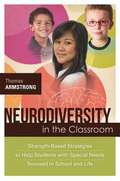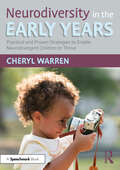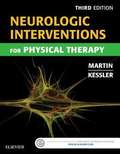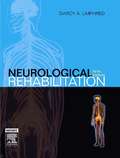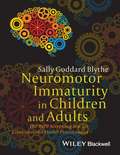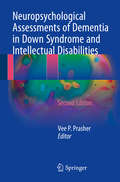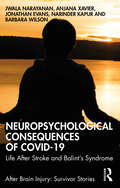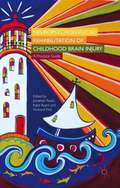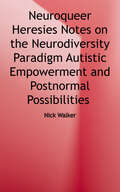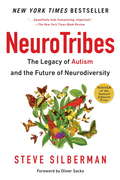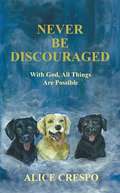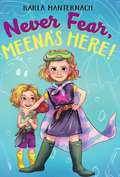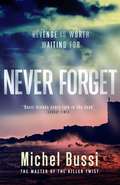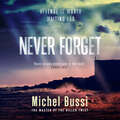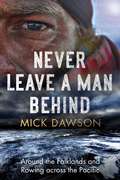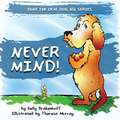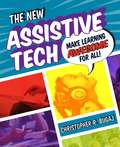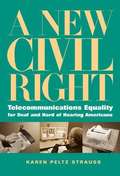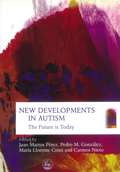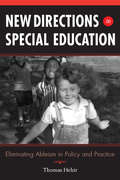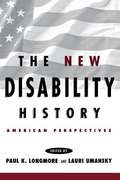- Table View
- List View
Neurodiversity in the Classroom: Strength-Based Strategies to Help Students with Special Needs Succeed in School and Life
by Thomas ArmstrongA new concept on human diversity has emerged over the past 10 years that promises to revolutionize the way educators provide services to students with special needs: neurodiversity. Just as we celebrate diversity in nature and cultures, so too do we need to honor the diversity of brains among our students who learn, think, and behave differently. In Neurodiversity in the Classroom, best-selling author Thomas Armstrong argues that we should embrace the strengths of such neurodiverse students to help them and their neurotypical peers thrive in school and beyond. This innovative book focuses on five categories of special needs: learning disabilities, attention deficit hyperactivity disorder, autism, intellectual disabilities, and emotional and behavioral disorders.
Neurodiversity in the Early Years: Practical and Proven Strategies to Enable Neurodivergent Children to Thrive
by Cheryl WarrenHow we support children in their early years to understand, to be accepted for their unique differences and to thrive, has a life-long impact. With a neuro-affirming, strength-based narrative running throughout, this accessible book will improve your knowledge, skillset and practical application of high-quality neuro-inclusive practice.In exploring the best practice to assist young neurodivergent children navigating the world, these eight succinct chapters will: Explore key topics, including how to create an environment to enable children to feel safe in your space Provide advice on how to work in a connective partnership with parents to enable a family to thrive, and how to create a whole setting approach to neuro-inclusion Include a range of first-hand accounts and case studies to bring theory to life Suggest a wealth of strategies that can be easily applied and will ensure that all children feel safe, connected and can achieve Neurodiversity in the Early Years enables the reader to embrace and embed knowledge and to advocate for a change which will provide neurodivergent children with the foundations of belonging, acceptance and a celebration of who they are. It will be key reading for all early years educators working with children from 2 to 5 years old.
Neurologic Interventions for Physical Therapy
by Suzanne Tink" Martin Mary KesslerMaster the role of the physical therapist or physical therapist assistant in neurologic rehabilitation! Neurologic Interventions for Physical Therapy, 3rd Edition helps you develop skills in the treatment interventions needed to improve the function of patients with neurologic deficits. It provides a solid foundation in neuroanatomy, motor control, and motor development, and offers clear, how-to guidelines to rehabilitation procedures. Case studies help you follow best practices for the treatment of children and adults with neuromuscular impairments caused by events such as spinal cord injuries, cerebral palsy, and traumatic brain injuries. Written by physical therapy experts Suzanne 'Tink' Martin and Mary Kessler, this market-leading text will help you prepare for the neurological portion of the PTA certification exam and begin a successful career in physical therapy practice. Comprehensive coverage of neurologic rehabilitation explores concepts in neuroanatomy, motor control and motor learning, motor development, and evidence-based treatment of adults and children with neuromuscular impairments.
Neurological Rehabilitation
by Darcy Umphred Gordon U. Burton Rolando T. Lazaro Margaret L. Roller.Explores various rehabilitation options for people with a neurological disorder in terms of latest screening and diagnostics, advances in treatment and interventions used in modern clinical practice.
Neuromotor Immaturity in Children and Adults
by Sally Goddard BlytheAvailable to healthcare professionals for the first time, this book contains proven screening tests to measure neuromotor immaturity in children and adults in order to provide a basis for referral and help. Allows practitioners to screen for disorders of movement that can negatively affect educational performance and emotional function in children and adolescents Assesses instances where disorders of movement in adults are affecting thoughts and behavior, as in panic disorder Provides a novel approach for health care professionals observing aberrant reflexes in the absence of more serious pathology Includes reproducible scoring and observation sheets for practice and serves as the perfect complement to Assessing Neuromotor Readiness for Learning
Neuropsychological Assessments of Dementia in Down Syndrome and Intellectual Disabilities
by Vee P. PrasherUp to the early 1980s neuropsychological assessments of persons with intellectual disability (ID) usually meant an assessment for developmental delay, of intelligence (intelligence quotient testing) or of level of adaptive behavior. Popular tests included the Stanford-Binet, Wechsler Intelligence Scales, Bayley Scales of Infant Development, the Griffin Mental Developmental Scales, and the Vineland Social Maturity Scale. These were assessments of the "overall" level of ability. Arthur Dalton in New York was one of a few pioneering clinicians who at this time, focused on the development of tests for specific areas of cognition in persons with ID. Following his work, sub- quent researchers, in the latter part of the twentieth century, have proposed and dev- oped a number of measures not only to detect the level of cognitive abilities but also to measure decline; a perquisite to the diagnosis of dementia. At the beginning of the twenty-first century as demonstrated in this book, several neuropsychological measures have been developed to aid the clinical diagnosis of dementia/dementia in Alzheimer's disease (AD). Neuropsychological assessments no longer remain the sole responsibility of psychologists, as psychiatrists, resear- ers, ID nurses, neuroscientists, all now play a part in the development and adm- istration of specific tests.
Neuropsychological Consequences of COVID-19: Life After Stroke and Balint's Syndrome (ISSN)
by Jwala Narayanan Anjana Xavier Jonathan Evans Narinder Kapur Barbara WilsonNeuropsychological Consequences of COVID-19 focuses on Anjana’s journey as a COVID survivor following a brain injury that left her with a very rare neuropsychological syndrome called Balint’s syndrome, a disorder associated with difficulties in visual and spatial coordination. It is also the first book of its kind to provide a first-hand account from India on surviving brain injury, from diagnosis, recovery and rehabilitation, providing the therapeutic milieu in the Indian context and exploring cultural influences on rehabilitation.Written jointly by Anjana, her neuropsychologist and the international experts in the field of neuropsychology who were also involved in her diagnosis and care, the book highlights how COVID-19, a virus primarily affecting the respiratory system, can also result in a disabling brain injury. It describes Anjana’s recovery and the rehabilitation she received and provides a deeper understanding of this experience of a very rare condition through the views of Anjana herself. In addition, Anjana’s rehabilitation journey stumbles upon many important themes of rehabilitation including cultural sensitivity, personal identity, resilience, role of family and rehabilitation in a low to middle income country.This book is valuable reading for clinical and neuropsychologists, neurologists, other rehabilitation therapists including physiotherapists, occupational therapists, nurses and social work professionals, particularly those interested in cross cultural rehabilitation. It will also be of interest to students in these fields.
Neuropsychological Rehabilitation of Childhood Brain Injury
by Jonathan Reed Katie Byard Howard FineIncreasing numbers of children and young people are surviving road traffic accidents and birth complications but are being left with neurological disability. Although a brain injury can be a potentially devastating childhood medical condition Neuropsychological rehabilitation of childhood brain injury explores the developing field of neuropsychology to aid rehabilitation. The book brings together contributions from leading international clinicians and researchers to describe not only what we understand about childhood brain injury but also what has been demonstrated to help and possible innovative directions that can be taken in the future. By including a comprehensive review of the neuropsychological consequences of child brain injury alongside solid research outcomes this book provides an authoritative guide on how to help children with brain injury using neuropsychology.
Neuroqueer Heresies: Notes on the Neurodiversity Paradigm, Autistic Empowerment, and Postnormal Possibilities
by Nick WalkerThe work of queer autistic scholar Nick Walker has played a key role in the evolving discourse on human neurodiversity. Neuroqueer Heresies collects a decade's worth of Dr. Walker's most influential writings, along with new commentary by the author and new material on her radical conceptualization of Neuroqueer Theory. This book is essential reading for anyone seeking to understand the foundations, terminology, implications, and leading edges of the emerging neurodiversity paradigm.
NeuroTribes
by Steve SilbermanA groundbreaking book that upends conventional thinking about autism and suggests a broader model for acceptance, understanding, and full participation in society for people who think differently. What is autism? A lifelong disability, or a naturally occurring form of cognitive difference akin to certain forms of genius? In truth, it is all of these things and more--and the future of our society depends on our understanding it. WIRED reporter Steve Silberman unearths the secret history of autism, long suppressed by the same clinicians who became famous for discovering it, and finds surprising answers to the crucial question of why the number of diagnoses has soared in recent years. Going back to the earliest days of autism research and chronicling the brave and lonely journey of autistic people and their families through the decades, Silberman provides long-sought solutions to the autism puzzle, while mapping out a path for our society toward a more humane world in which people with learning differences and those who love them have access to the resources they need to live happier, healthier, more secure, and more meaningful lives. Along the way, he reveals the untold story of Hans Asperger, the father of Asperger's syndrome, whose "little professors" were targeted by the darkest social-engineering experiment in human history; exposes the covert campaign by child psychiatrist Leo Kanner to suppress knowledge of the autism spectrum for fifty years; and casts light on the growing movement of "neurodiversity" activists seeking respect, support, technological innovation, accommodations in the workplace and in education, and the right to self-determination for those with cognitive differences.From the Hardcover edition.
Never Be Discouraged: With God, All Things Are Possible
by Alice CrespoAlice Crespo was born in New York City, raised in Brooklyn, and grew up totally blind. She had to learn many things, and she realized that, with God's help, there was nothing that she couldn't do. The sky was the limit. Alice is now sixty years of age, and she wants to share her experiences and her life lessons with you. Here is her story. Contains image descriptions.
Never Fear, Meena's Here! (The Meena Zee Books)
by Karla ManternachMeena discovers the secret to being a good friend and big sister in this superpower-filled sequel to Meena Meets Her Match that&’s perfect &“for Junie B. graduates&” (Kirkus Reviews).Meena&’s life is more colorful than ever. When she finds a mysterious ring that seems to give her powers, Meena sets out to prove that she&’s a superhero. The trouble is, her best friends might not believe her, Meena&’s little sister wants to be more than just a sidekick, and worst of all, an incident at school makes everyone think Meena is the one who needs to be saved. But even heroes need help from their friends sometimes. If Meena can figure that out, she might just discover her true powers…and theirs!
Never Forget: The #1 bestselling novel by the master of the killer twist
by Michel BussiA #1 INTERNATIONAL BESTSELLER A SUNDAY TIMES CRIME BOOK OF THE MONTH'Outrageously entertaining' The Times'A tantalising story that wraps the reader in myriad enigmas - utterly spellbinding'Daily Mail'As exhilarating as Bussi's breakthrough novel After the Crash' The Sunday Times 'Agatha Christie updated and then cranked up to 11: a blast' Shots Magazine REVENGE IS WORTH WAITING FOR... Jamal loves to run. But one morning - as he is training on a path winding up a steep cliff - he stumbles across a woman in distress.It's a matter of seconds: suddenly she is falling through the air, crashing on the beach below.Jamal is only an unlucky bystander - or is he?His version of events doesn't seem to fit with what other eyewitnesses claim to have seen. And how to explain the red scarf carefully arranged around the dead woman's neck?Perhaps this was no accident after all.Or perhaps there is something more sinister afoot - a devilish plan decades in the making, masterminded by someone hell-bent on revenge.MICHEL BUSSI: THE MASTER OF THE KILLER TWISTBeloved by readers... 'I didn't anticipate all the twists and turns in this cleverly plotted novel''The final twist is a bit of a jaw dropper''Twists and turns aplenty!''A twisting, turning story which clobbers you with a number of cracking twists!''Fast-paced and chock full of twists, turns and red herrings' ...and critics 'A novel so extraordinary that it reminded me of reading Steig Larsson for the very first time . . . I doubt I'll read a more brilliant crime novel this year' Sunday Times on After the Crash'A dazzling, unexpected and haunting masterpiece' Daily Mail on Black Water Lilies'Inventive, original and incredibly entertaining' Sunday Mirror on Don't Let Go'Combines an extraordinarily inventive plot with characters haunted by long-ago events - and demonstrates why he has such a hold on readers' Sunday Times on Time is a Killer
Never Forget: The #1 bestselling novel by the master of the killer twist
by Michel BussiA #1 INTERNATIONAL BESTSELLERA SUNDAY TIMES CRIME BOOK OF THE MONTH'Outrageously entertaining' The Times'Utterly spellbinding' Daily Mail'As exhilarating as Bussi's breakthrough novel After the Crash' The Sunday Times'Agatha Christie updated and then cranked up to 11: a blast' Shots MagazineJamal loves to run. But one morning - as he is training on a path winding up a steep cliff - he stumbles across a woman in distress. It's a matter of seconds: suddenly she is falling through the air, crashing on the beach below.Jamal is only an unlucky bystander - or is he? His version of events doesn't seem to fit with what other eyewitnesses claim to have seen. And how to explain the red scarf carefully arranged around the dead woman's neck? Perhaps this was no accident after all. Or perhaps there is something more sinister afoot - a devilish plan decades in the making, masterminded by someone hell-bent on revenge.
Never Give Up!
by Ron Heagy Jr. Donita DyerSo begins Ron Heagy's amazing story. The surfing accident that left him a quadriplegic the day before his eighteenth birthday became the basis for a ministry that today touches thousands of people. Ron's intensely personal, often humorous, recounting of his path from pain, discouragement, and angry rebellion to a mature faith and peaceful heart is a testimony to God's power to change attitudes and to change lives. But more than one man's story, it is also the story of family, friends, and total strangers who, used by God, helped make Ron's life whole again. Ron writes, "I asked God to heal my body and let me walk again. He didn't answer my prayers in the way I had hoped he would. . . But I'm learning, with every day that I live and every life that touches mine, that this is where I'm supposed to be -- here, in this wheelchair, doing God's work. "With this updated edition of Life Is an Attitude, readers of all ages will be drawn to Ron's frank, fresh narrative and be moved to examine their own faith and what it means to truly trust the Lord.
Never Leave a Man Behind: Around the Falklands and Rowing across the Pacific
by Mick Dawson'Mick Dawson's gripping Never Leave A Man Behind, effectively two adventure stories for the price of one, can be justifiably described as "unputdownable". Dawson is a man you would want on your side, whether in battle or tackling waves as high as houses should you ever consider rowing the Pacific.'Sports Book of the Month'An excellent read, it puts you in the boat, understanding what it's like to be in an extremely challenging environment while maintaining composure, cheerfulness and respect for your fellow men. I cannot recommend it highly enough'Keith M. Breslauer, Trustee of The Royal Marines Charity'Breathtaking - builds tension from the very start with life-and-death challenges throughout. Courage and comradeship at their very best, showing how mental and physical disabilities cannot and are not allowed to define or undermine the human self. Leaves you in awe and respect for one man determined to help his muckers win their battles whatever it takes - at great personal cost'Jonathan Ball, Director, The Royal Marines CharityThe stories of two veterans - one traumatised, one blind - who rediscover themselves with the help of a friend in the course of two epic ocean adventures, kayaking around the Falklands and rowing across the Pacific.Mick Dawson tells the story of kayaking around the Falkland Islands with friend and fellow Royal Marines veteran Steve Grenham, who was struggling to cope with the effects of Post-Traumatic Stress Disorder (PTSD), and the extraordinary tale of his 2,500-mile voyage in a rowing boat with his friend and former Royal Marine Commando Steve 'Sparky' Sparkes, who was not only a rowing novice, but also blind. Sparky and Mick succeeded in rowing across the finish line after a truly epic voyage of over 2,500 miles from Monterey Bay in California to Waikiki, Hawaii. They'd hoped to break the record for a two-man rowboat and finish in less than fifty-five days, but a hurricane interfered with their plans. It took them eighty-two days, sixteen hours and fifty-four minutes to complete the race, but it was an even greater achievement for that, and Sparky became the first visually impaired person to row across the Pacific.The race with Sparky was the second expedition of an organisation Mick had set up a few years earlier, The Cockleshell Endeavour, designed to help another former Royal Marine and friend, Steve Grenham, by kayaking with him around the Falklands, where both former commandos served during the 1982 conflict with Argentina.
Never Leave a Man Behind: Around the Falklands and Rowing across the Pacific
by Mick Dawson'Mick Dawson's gripping Never Leave A Man Behind, effectively two adventure stories for the price of one, can be justifiably described as "unputdownable". Dawson is a man you would want on your side, whether in battle or tackling waves as high as houses should you ever consider rowing the Pacific.'Sports Book of the Month'An excellent read, it puts you in the boat, understanding what it's like to be in an extremely challenging environment while maintaining composure, cheerfulness and respect for your fellow men. I cannot recommend it highly enough'Keith M. Breslauer, Trustee of The Royal Marines Charity'Breathtaking - builds tension from the very start with life-and-death challenges throughout. Courage and comradeship at their very best, showing how mental and physical disabilities cannot and are not allowed to define or undermine the human self. Leaves you in awe and respect for one man determined to help his muckers win their battles whatever it takes - at great personal cost'Jonathan Ball, Director, The Royal Marines CharityThe stories of two veterans - one traumatised, one blind - who rediscover themselves with the help of a friend in the course of two epic ocean adventures, kayaking around the Falklands and rowing across the Pacific.Mick Dawson tells the story of kayaking around the Falkland Islands with friend and fellow Royal Marines veteran Steve Grenham, who was struggling to cope with the effects of Post-Traumatic Stress Disorder (PTSD), and the extraordinary tale of his 2,500-mile voyage in a rowing boat with his friend and former Royal Marine Commando Steve 'Sparky' Sparkes, who was not only a rowing novice, but also blind. Sparky and Mick succeeded in rowing across the finish line after a truly epic voyage of over 2,500 miles from Monterey Bay in California to Waikiki, Hawaii. They'd hoped to break the record for a two-man rowboat and finish in less than fifty-five days, but a hurricane interfered with their plans. It took them eighty-two days, sixteen hours and fifty-four minutes to complete the race, but it was an even greater achievement for that, and Sparky became the first visually impaired person to row across the Pacific.The race with Sparky was the second expedition of an organisation Mick had set up a few years earlier, The Cockleshell Endeavour, designed to help another former Royal Marine and friend, Steve Grenham, by kayaking with him around the Falklands, where both former commandos served during the 1982 conflict with Argentina.
Never Mind (Duke the Deaf Dog ASL Series)
by Kelly BrakenhoffDuke the Deaf Dog doesn't like being told "never mind." Whether it happens at preschool or the park, both parents and children will relate to feeling left out when you aren't part of the action. A great way to teach children that everyone deserves to be included in conversations. <P><P><i>Advisory: This book offers only partial accessibility. We have kept it in the collection because it is useful for some of our members. Benetech is actively working on projects to improve accessibility issues such as these in the future.</i>
The New Assistive Tech: Make Learning Awesome For All!
by Christopher BurgajSchool districts often struggle to develop consistent practices for meeting the assistive needs of special education students. This playful yet professional book will help public school educators select, acquire and implement technology to help all students, but especially those with special needs. The New Assistive Tech is a catalyst for breaking down walls between special education and general education, and will help all educators realize they have tech knowledge (and can build upon that knowledge) that can be used to support students with disabilities. <p><p> This book: details how an educational team can request assistance to determine technology needs; explains how to conduct and document assessments to help an educational team make informed decisions about technology needs; describes a proactive approach to professional development for individuals and for those who train others on the use of technology; assists individuals or teams in creating an action plan for developing a culture of inclusion; and interweaves stories, songs and other exciting features to make learning fun!
The New Boy Is Blind
by William J. Thomasfrom the book jacket: Ricky is in the fourth grade-but he's never been in school before. He is just like all his classmates except for one special difference-he is blind. How he adjusts to this new world of the clasroom, the playground, and the people around him-and how they adjust to him-makes a sensitive story about frustration and triumph. Ricky's friends, teachers, and, most of all, his mother learn an important lesson that while Ricky is blind, he is still able to do everything.
A New Civil Right: Telecommunications Equality for Deaf and Hard of Hearing Americans
by Karen Peltz StraussKaren Peltz Strauss reveals how the paternalism of the hearing-oriented telecommunications industries slowed support for accessible technology for the deaf and hard of hearing users.
New Developments in Autism: The Future is Today
by Manuel F. Casanova Carmen Nieto Vizcaino Pedro M. Gonzalez Juan Marto Perez Sally Wheelwright Maria Llorente ComiThis international collection provides a comprehensive overview of cutting-edge research on autism spectrum disorders (ASDs) by well-known experts in the field, stressing the importance of early diagnosis and a good working relationship between parents and professionals. The contributors cover a wide range of aspects of ASDs, from early assessment techniques, neurodevelopment and brain function to language development, executive function and genetic research. They explore how individuals with ASDs think and give evidence-based guidance on how to handle difficulties with social interaction and language development using appropriate interventions. New Developments in Autism will be of great interest to professionals, researchers, therapists, parents and people with ASDs.
New Directions in Special Education: Eliminating Ableism in Policy and Practice
by Thomas HehirA comprehensive study that is also practical and realistic, New Directions in Special Education outlines principles for decisionmaking about special education at every level--from the family to the classroom, school, and district--and for state and federal policy. With this volume, leading scholar and disability advocate Thomas Hehir opens a new round of debate on the future of special education. Extending the conceptual framework developed in his seminal 2002 article in the Harvard Educational Review, "Eliminating Ableism in Education," Hehir examines the ways that cultural attitudes about disability systematically distort the education of children with special needs and uses this analysis to lay out a fresh approach to special education policy and practice. Hehir traces the roots of "ableism"--the pervasive devaluation of people with disabilities--and shows how negative attitudes continue to shape debates in the field. He assesses recent trends in special education policy, particularly the shift of emphasis from compliance to outcomes, and discusses in depth the successes and limitations of the inclusion movement. He also investigates the impact of standards-based reforms on children with disabilities and critically examines the promise of Universal Design for Learning.
New Directions in Special Education: Eliminating Ableism in Policy and Practice
by Thomas HehirA comprehensive study that is also practical and realistic, New Directions in Special Education outlines principles for decisionmaking about special education at every level—from the family to the classroom, school, and district—and for state and federal policy. With this volume, leading scholar and disability advocate Thomas Hehir opens a new round of debate on the future of special education. Extending the conceptual framework developed in his seminal 2002 article in the Harvard Educational Review, "Eliminating Ableism in Education," Hehir examines the ways that cultural attitudes about disability systematically distort the education of children with special needs and uses this analysis to lay out a fresh approach to special education policy and practice. Hehir traces the roots of "ableism"—the pervasive devaluation of people with disabilities—and shows how negative attitudes continue to shape debates in the field. He assesses recent trends in special education policy, particularly the shift of emphasis from compliance to outcomes, and discusses in depth the successes and limitations of the inclusion movement. He also investigates the impact of standards-based reforms on children with disabilities and critically examines the promise of Universal Design for Learning.
The New Disability History: American Perspectives
by Paul K. Longmore Lauri UmanskyDisability has always been a preoccupation of American society and culture. From antebellum debates about qualification for citizenship to current controversies over access and reasonable accommodations, disability has been present, in penumbra if not in print, on virtually every page of American history. Yet historians have only recently begun the deep excavation necessary to retrieve lives shrouded in religious, then medical, and always deep-seated cultural, misunderstanding.<P> This volume opens up disability's hidden history. In these pages, a North Carolina Youth finds his identity as a deaf Southerner challenged in Civil War-era New York. Deaf community leaders ardently defend sign language in early 20th century America. The mythic Helen Keller and the long-forgotten American Blind People's higher Education and General Improvement Association each struggle to shape public and private roles for blind Americans. White and black disabled World War I and II veterans contest public policies and cultural values to claim their citizenship rights. Neurasthenic Alice James and injured turn-of-the-century railroadmen grapple with the interplay of disability and gender. Progressive-era rehabilitationists fashion programs to make crippled children economically productive and socially valid, and two Depression-era fathers murder their sons as public opinion blames the boys' mothers for having cherished the lads' lives. These and many other figures lead readers through hospital-schools, courtrooms, advocacy journals, and beyond to discover disability's past.<P> Coupling empirical evidence with the interdisciplinary tools and insights of disability studies, the book explores the complex meanings of disability as identity and cultural signifier in American history.
